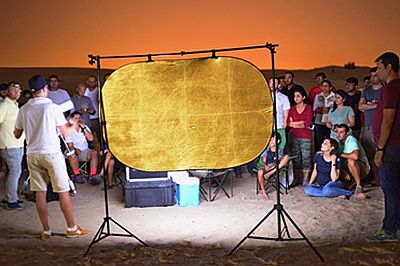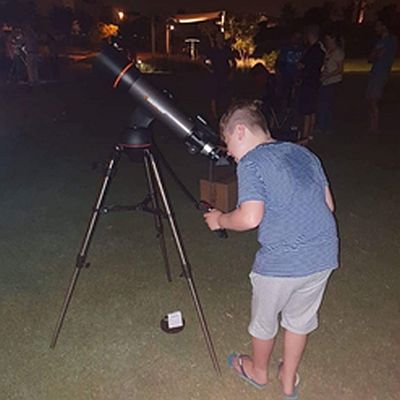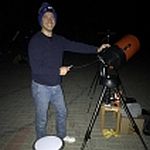GAM 2019 Blog
By Roger Hambleton
- Published: Thursday, April 18 2019 06:38
Writing about Astronomy is a special skill. Whether it’s a scientific article or a piece of advice, it’s not something just anybody can easily do. What does an amateur astronomer write about? Common topics are: what they like to observe, what equipment they like, what equipment they don’t like, etc. – but all of these topics are beyond cliché. For me personally, these are just a few topics that have been in my head for a few years now as I became involved in outreach and bringing people into the hobby. No topic moves me quite like what's coming to the UAE did to accelerate my passion for the universe.
Rigel. It means "foot" in Arabic. A 9-year-old kid told me this at a public observing session I hosted in a Dubai park. Mirfak. That means "elbow" in Arabic. My elderly Palestinian friend, who is also an amateur astronomer, told me that one. My expectations as to what astronomy would be like in Dubai were mixed. I knew coming here that many stars had Arabic names, but I wasn’t sure exactly what that meant in the city of dazzling buildings, exotic cars, and nice beaches.
The People
When I arrived here, I was welcomed with open arms by the amateur astronomers of this country – most of which are Arab or Indian expats. To the contrary of what I had expected, I found some people here were doing some very meaningful things. Whether it's Anas Albounni, whose work in astrophotography has been featured by National Geographic Magazine, or Prabhu Kutti of India, who has earned modest fame via his science themed YouTube channel, I was impressed at the level of some of the talent here (I encourage you to look them up online).
But what about people who casually attend star parties? Are they ‘believers’ in the natural wonders of the cosmos? Before having started doing outreach in the UAE, I would have definitely thought that’s what it would be like. Tradition, superstition, a general closed-minded approach to science. As with many prejudices, it turned out to not be that way at all. Peering through a telescope at Saturn or just gazing up at the Milky Way in a dark patch of the desert, strikes an awe in young and old that I have found to be universal and people’s interest in the topic is genuine and purely scientific.
The Conditions
The weather conditions for astronomy in the UAE are truly ideal. When the wind is still, and it’s not too hot out, magnitude 6 objects are clearly visible with the naked eye. Most astronomers stick to the mountainous area of Ras Al Khaima near the Oman border and the rural desert areas in Abu Dhabi – those places provide the absolute best conditions for astronomy.
Winter observing is incredible in the UAE. While my friends in Europe and North America freeze their toes nearly to the point of amputation, I am observing the Great Nebula of Orion, M79 in the Lepus constellation, and the Double Cluster of Perseus in complete comfort. That being said, high levels of humidity and high temperatures in the summer make observing the sky not only difficult, but also extremely uncomfortable.
The Good
Maybe the most exciting thing about being in the UAE right now is that the rulers of the country are taking space exploration seriously. Just last year (Oct. 2018), they launched the first totally UAE-made satellite into space take photos of the geography and mapping weather patterns. An even more exciting mission is the one that will see the country launch its first citizen into space in April this year (2019), thus adding the UAE flag to the list of countries which have sent an astronaut the International Space Station (ISS). For someone who not only loves observing the wonders of the universe and filming the solar system’s magnificent planets, being able to follow this small country’s progress from the front row of the theatre is exciting.
Disappointments
As with anything in life, there are always disappointments, and the same goes with astronomical observing here in the UAE. It’s very difficult to keep your equipment clean in the UAE due to the amount of dust and sand in the air – if you ever make your way here with a telescope or camera, be prepared to give your equipment a good cleaning the next morning after using. Apart from the dirt, the light is also becoming an issue in the UAE, as it is in most places. Fully lit highways, new hotels in rural areas, and military posts are killing the night sky in this dry and generally cloudless country. Just an unfortunate side effect of the UAE’s fabulous wealth which on the flip-side, has contributed to its entry to space exploration.
Conclusions
The Arabic connection to astronomy is not only in the names of the stars we look at, but also in the people living in the Middle East who observe it, photograph it, and study it today. Having come here from Poland, a country where I had maybe 4 clear nights a year, and where investments in space exploration are modest at best, I truly appreciate what I have here in the UAE. In the UAE I have a front row seat to the emergence of a new space-faring nation and the conditions here, have resulted in significant improvement in my planetary photography development. On top of all that, I get to observe the beautiful Globular Cluster of Omega Centauri, albeit low on the horizon, just when the time is right.
As I conclude my message, I offer a few photos of the diverse groups that come to love the sky in the UAE. Clear skies friends!


|
Roger Hambleton is an amateur astronomer located in the UAE, originally from Canada. His main interests in the field of astronomy are planetary observations, planetary photography, and space exploration. |
 |






